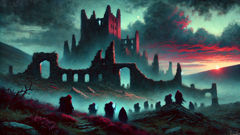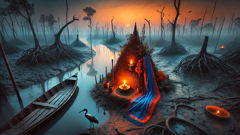Introduction
Between the misty moors and wind-blasted crags of the Anglo-Scottish borderlands, there’s a tale older than stone. The land itself seems to lean into the legend, its lonely castles and ruined towers standing sentinel over centuries of whispered fears. Here, history and myth entwine like tangled brambles. The nights stretch long, draped in velvet fog and the far-off howls of wolves; the wind that rattles through arrow slits carries secrets that no living soul dares recall aloud. This is a country shaped by violence and suspicion, where border reivers once galloped under cover of darkness, and where the deepest shadows belong not just to men, but to something older, something wholly inhuman: the Redcaps.
Stories of the Redcaps have haunted this region for generations. They’re the monsters mothers invoke to hush a child, and the terror that keeps even the bravest men close to the fire after sundown. Unlike the sly, mischievous sprites of other British tales, Redcaps are altogether more sinister. Their name comes from their gruesome habit—so it’s said—of soaking their caps in the blood of travelers unlucky enough to cross their path. Bloodthirsty, iron-shod, with glowing eyes and claws like blackened sickles, they roam ruined castles and deserted towers, drawn to conflict, misery, and the scent of fear. Their presence is heralded by a sudden chill in the marrow, the iron tang of blood on the air, and the feeling of being watched from the dark.
Yet for all their savagery, the Redcaps have always belonged to the margins. Their world is one of crumbling battlements, bracken-choked halls, and lonely moors awash in moonlight—a liminal space between the living and the dead, between the waking world and nightmare. And within this twilight realm, a single traveler’s courage, or a community’s unspoken bond, might just prove enough to tip the balance, if only for a night.
Here unfolds the legend of Sir Alaric Tremayne—a tale carried on the winds of the borderlands, of a journey through haunted places, a brush with darkness incarnate, and the quiet light that endures in the hearts of those who refuse to surrender to terror.
The Traveler and the Old Road
Sir Alaric Tremayne was no stranger to peril. Raised on tales of the border reivers and the ever-present threat of English raids, he’d learned young that the world was both beautiful and cruel. Now, riding alone beneath the bruised sky of early autumn, he pressed his horse onward along the old Roman road. Its flagstones were slick with moss and centuries of rain, winding through bracken and gorse toward the crumbling ramparts of Elsdon Tower.
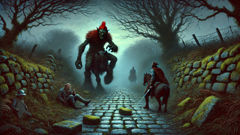
The village of Elsdon lay half-forgotten at the edge of the Cheviot Hills, its cottages hunched beneath sagging thatch, smoke curling from their chimneys into the evening. Alaric had been sent by Lord Fenwick to carry a message—ostensibly a warning about renewed raiding across the Tyne, but in truth, he knew, it was little more than an excuse to rid Fenwick Hall of a second son with too much pride and not enough sense. Yet Alaric accepted the task. Something in the land itself called to him: the wildness, the unspoken histories, the promise of redemption for a family whose name had grown as ragged as its banners.
As dusk deepened, a chill settled over the moors. The hedgerows pressed close, and the sky bruised purple behind racing clouds. Every so often, Alaric’s horse pricked its ears, nostrils flaring at scents unseen. The silence pressed in, heavy and expectant, broken only by the distant croak of a raven or the skittering of unseen creatures in the brush.
He remembered his grandmother’s stories, spoken in hushed tones by the fire: “Don’t stray from the road after dark, lad. The Redcaps hunt at twilight. No armor or sword will save you if they catch your scent. Only faith, or iron, or words of true kindness can turn them aside.”
Despite himself, Alaric reached for the hilt of his sword, fingers brushing the cold steel. He glanced skyward, where the moon hung low and veiled. In the borderlands, superstition was as real as hunger or war. He pressed on, the road narrowing as trees overarched, their branches knitting together overhead.
It was then he heard it—a sharp, metallic tapping. Not the soft tread of animal paws, nor the erratic rustle of foxes. No, this was something deliberate, measured: a sound like iron boots on stone. His mount whinnied, tossing its head. Alaric soothed the beast, though his heart thundered in his chest.
The air thickened, tinged with a faint coppery scent. Alaric slowed, peering into the gathering gloom. Along the verge, brambles stirred without wind. Then—a flash of crimson. A figure hunched by the roadside, no taller than a child, its head crowned with a cap as red as arterial blood. Its face was pale and leathery, with yellow eyes that burned coldly in the dusk.
Alaric’s breath caught. The Redcap grinned, revealing teeth like shards of old bone. Its iron-shod boots gleamed dully, and its hands—long-fingered, tipped with black claws—clutched a jagged staff.
He remembered: “Speak them fair, lad. Show no fear.”
Summoning every scrap of courage, Alaric inclined his head. “Evening, friend. The night grows chill, and I’ve no quarrel with those who share the road.”
The Redcap hissed, a sound like steam from a boiling kettle. Two more shapes materialized behind it—one with a cap drooping over a single jaundiced eye, another gnawing something that might once have been a rat. The air stank of old blood and damp earth.
Yet Alaric’s words seemed to give them pause. The lead Redcap cocked its head. “Most passers run or pray,” it croaked. “You stand and speak.”
Alaric shrugged, though his grip tightened on the reins. “I was taught to respect all who walk this land, be they man or… otherwise.”
The Redcap’s grin widened, stretching its skin taut. “Bold words for soft flesh.”
From the shadows, more figures emerged. The path was blocked; escape, impossible. Alaric’s horse shuddered, white-eyed with terror.
“Tell me,” said Alaric quietly, “is it true you favor iron as much as blood?”
At this, the Redcap scowled. “Iron wounds. But blood heals. Blood for our caps—blood for our Queen.”
Behind them, in the deeper dark, something vast and ragged moved—taller than any man, crowned with antlers of twisted bone. Alaric’s skin prickled. The Queen of the Redcaps, perhaps, or a nightmare given flesh. He forced himself not to look away.
“Then take this gift,” he said, drawing a dagger from his belt—a blade forged of old border iron. He tossed it to the lead Redcap’s feet. “A token, for safe passage.”
The goblin eyed the blade, suspicion battling hunger. It bent, sniffed the iron, and recoiled. “Trickster!” it spat. But behind it, the others shrank back, muttering in their guttural tongue.
Alaric held his ground. “I offer respect. Let me pass, and I’ll speak well of your folk at every hearth.”
There was a long silence. The Redcap leader snatched up the blade with a rag-wrapped hand, keeping it at arm’s length. “Go,” it hissed. “But know this: Elsdon Tower is not safe for your kind. Not tonight.”
Alaric nodded, urging his horse forward as the Redcaps melted into the gloom. Behind him, the metallic tap of iron boots faded. But their eyes followed him all the way to the ruined tower, where greater dangers still waited.
He reached Elsdon just as night fell, heart pounding—not in triumph, but in wary gratitude. He had met the Redcaps and survived, for now.
Elsdon Tower and the Queen in Antlers
Elsdon Tower loomed black against the sky, its battlements gnawed by time and neglect. Windows yawned empty; wind moaned through arrow slits. Alaric dismounted and led his horse toward the gatehouse, half-expecting to find it barred, but the doors hung askew, long since abandoned. The village itself was silent—no welcome lanterns, no voices raised in greeting or warning. Only the hush of dread.
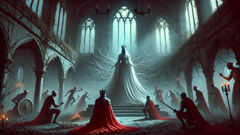
Alaric stabled his horse in a shed that stank of rot and old straw. He found a lantern, its oil low but still usable, and lit it with trembling fingers. The yellow glow danced on flagstones slick with lichen, illuminating deep claw marks etched into the walls—signs of desperate struggles, or perhaps something darker.
He moved through the empty halls, the silence growing oppressive. Once, this had been a stronghold; now, it was little more than a mausoleum. Tattered banners clung to the walls, their devices indistinct beneath centuries of grime. Shadows gathered in every corner.
The night deepened. Alaric found a chamber with a fireplace and coaxed a fire from the last of the dry wood. As flames took hold, the wind shifted—bringing with it a susurrus of voices and distant tapping, as if iron boots paced unseen above.
He drew his sword and set his back to the wall. Outside, clouds swept across the moon, casting patterns of light and shadow through broken glass. His grandmother’s words echoed: “In ruined places, their Queen holds court. If you see her antlers, kneel—not in worship, but in humility.”
The fire flickered, guttered low. Then—a shape moved beyond the threshold. Not a goblin this time, but a woman: tall, impossibly pale, with hair the color of dead bracken and eyes that shone like polished amber. On her brow, a crown of antlers—bone-white, sprawling in every direction.
She glided into the room, her gown trailing like mist. The Redcaps followed, crawling and capering at her heels, their caps brighter than fresh wounds. The air grew cold enough to frost breath.
Alaric forced himself to kneel—not in fear, but as a sign of respect for the ancient powers of this place.
The Queen’s voice was like wind over stone. “Why do you trespass here, mortal? Blood stains these halls; the walls remember every scream.”
Alaric met her gaze. “I come not for conquest or plunder. Only to bear a message—and seek shelter from the dark.”
She laughed, a sound sharp as breaking glass. “Few ask for mercy in my court.”
He bowed his head. “Mercy is a gift, not a right. But even your folk were not always as they are now. I’ve heard the stories—of when Redcaps were guardians, not monsters.”
A murmur rippled through the goblins. The Queen’s eyes narrowed. “You know much for a border knight.”
“I know that darkness breeds darkness,” Alaric said quietly. “But even now, a light may endure.”
The Queen studied him for a long moment. “You speak as one who has lost much.”
He nodded. “And so I would lose no more.”
She lifted a hand. The Redcaps drew back, hissing. “You honor our memory,” she said, “but you walk close to death. This tower is cursed by old oaths—a slaughter ground for both men and monsters.”
“Then let me break the curse,” Alaric pleaded. “Let me pass through this night without bloodshed.”
The Queen considered. “Bring peace to this place—let the living remember the dead with kindness—and my folk will trouble you no more.”
With that, she faded into shadow, her retinue trailing after. The fire flared, then dimmed. Alaric sat alone, heart pounding, but alive.
Dawn was still hours away.
Blood on the Stones: Breaking the Curse
The fire burned low as Alaric listened to the ancient stones of Elsdon Tower whisper their sorrow. He felt the weight of centuries pressing down: every betrayal, every act of vengeance, every drop of blood spilled on these flagstones had fed the curse that kept Redcaps tethered here, hungry and restless. He thought of all who’d fallen—villagers, soldiers, wanderers—none remembered save for the stains on the floor and the terror in local memory.
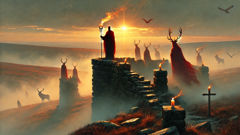
But he also remembered his grandmother’s second lesson: “The dead want to be remembered kindly. Light a candle for them. Speak their names.”
Rising with resolve, Alaric gathered what he could—a stub of tallow candle, some oil from his lantern, a scrap of cloth for a makeshift wick. He climbed to the battlements as dawn struggled to break through the clouds. There, overlooking the mist-wreathed moors, he set the candle atop a broken merlon.
He spoke aloud every name he could recall from stories and old ballads: “For Eleanor of Elsdon, slain in her sleep. For Will of the Crooked Sword, lost to treachery. For every soul claimed by greed and fear and pride—let peace come to this place.”
As he spoke, the wind stilled. The Redcaps crept from shadowy corners, drawn by something unfamiliar: not bloodlust, but hope. Their eyes shone less fiercely; their teeth were bared not in hunger, but in uncertain longing.
The Queen appeared beside him, her form less spectral now—more like a memory half-recalled. “You remember them,” she said softly. “That is power.”
Alaric nodded. “Let it be enough.”
The candle burned, tiny and defiant against the gloom. One by one, the Redcaps dipped their caps in the golden light—not blood this time, but the warmth of memory. Their garments faded from crimson to russet; their eyes grew gentle.
As the sun breached the horizon, fog lifting from the moor, the Redcaps faded—first their caps, then their hunched bodies, until only motes of light remained. The Queen lingered a moment longer, offering Alaric a nod of gratitude.
“Remember us with kindness,” she whispered. “And tell our story true.”
With that, she vanished. Elsdon Tower felt lighter, the air cleansed of old violence. Alaric stood alone as birds sang in the new day.
He gathered his things and rode from the ruin, glancing back only once. Where dread had ruled for centuries, now peace held sway. The legend of the Redcaps would remain—a warning, perhaps, but also a lesson in remembering those lost not as monsters, but as kin whose grief had turned to fury.
As he crossed the borderlands, Alaric’s heart was lighter than it had been in years. He bore with him not just Lord Fenwick’s message, but a deeper story—one that would echo down generations, reminding all who heard it that even in places haunted by blood and sorrow, light can endure if only someone dares to kindle it.
Conclusion
The legend of the Redcaps still whispers across the borderlands, echoing among stone ruins and misty hills. Those who listen closely may sense a shift in the air around old castles—a gentling of shadows, a warmth where cold once ruled. The tale of Sir Alaric Tremayne is retold not as a warning alone, but as a reminder: even in places long haunted by violence and loss, memory and kindness can break the oldest curses. The Redcaps have faded into myth, but their story endures as a lesson about facing darkness with courage, respect, and remembrance. The borderlands remain wild and mysterious, yet every candle lit against the night is a promise that hope—no matter how fragile—will always find a way.

